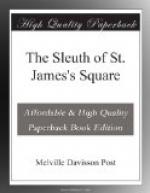“`I used to be something of a surgeon,’ he said, `Doctor Ulrich von Plutonburg, if you will remember. I’ll take a look at your arm.’
“tit, Alban said he thought the man might be moved by some humane consideration, so he put out his arm.
“Plutonburg took the pins out of the sleeve and removed the bandage that the nurse had put on in the Hotel Meurice. Then he held it up. The long, cotton bandage was lined with glazed cambric, and on it, in minute detail, was the exact position of all the Allied forces along the whole front in the region of the Somme, precisely as they had been massed for the drive on July first!”
I cried out in astonishment. “So that’s what you meant,” I said, “by the trailed thing turning on him!”
“Precisely,” replied the Baronet. “The very thing that St. Alban labored to prevent another from doing, he did awfully himself!”
The big Englishman’s fingers drummed on the table.
“It was a great moment for Plutonburg,” he said. “No living man but that Prussian could have put the Satanic humor into the rest of the affair.”
He paused as under the pressure of the memory.
“St. Alban always maintained that from the moment he saw the long map on the bandage everything blurred around him, and began to clear only when he spoke on the deck. He used to curse this blur. It made him a national figure and immortal, but it prevented him, he said, from striking the Prussian in the face.”
XVI. The House by the Loch
There was a snapping fire in the chimney. I was cold through and I was glad to stand close beside it on the stone hearth. My greatcoat had kept out the rain, but it had not kept out the chill of the West Highland night. I shivered before the fire, my hands held out to the flame.
It was a long, low room. There was an ancient guncase on one side, but the racks were empty except for a service pistol hanging by its trigger-guard from the hook. There were some shelves of books on the other side. But the conspicuous thing in the room was an image of Buddha in a glass box on the mantelpiece.
It was about four inches high, cast in silver and, I thought, of immense age.
I had to wait for my uncle to come in. But I had enough to think about. Every event connected with this visit seemed to touch on some mystery. There was his strange letter to me in reply to my note that I was in England and coming up to Scotland. Surely no man ever wrote a queerer letter to a nephew coming on a visit to him.
It dwelt on the length of the journey and the remoteness of the place. I was to be discouraged in every sentence. I was to carry his affectionate regards to the family in America and say that he was in health.
It stood out plainly that I was not wanted.
This was strange in itself, but it was not the strangest thing about this letter. The strangest thing was a word written in a shaky cramped hand on the back of the sheet: the letters huddled together: “Come!”




